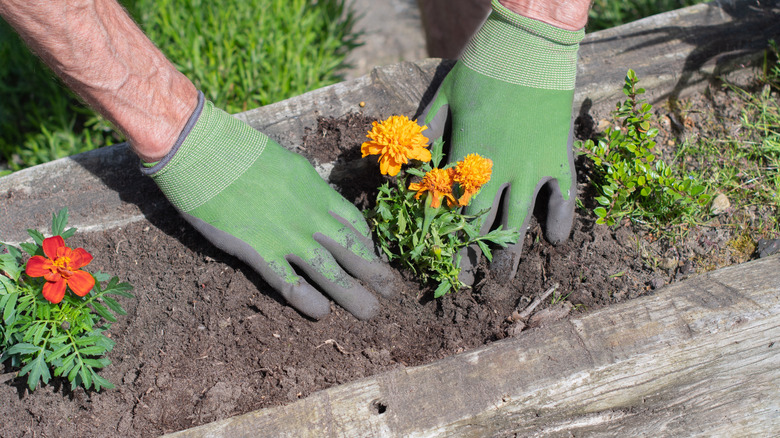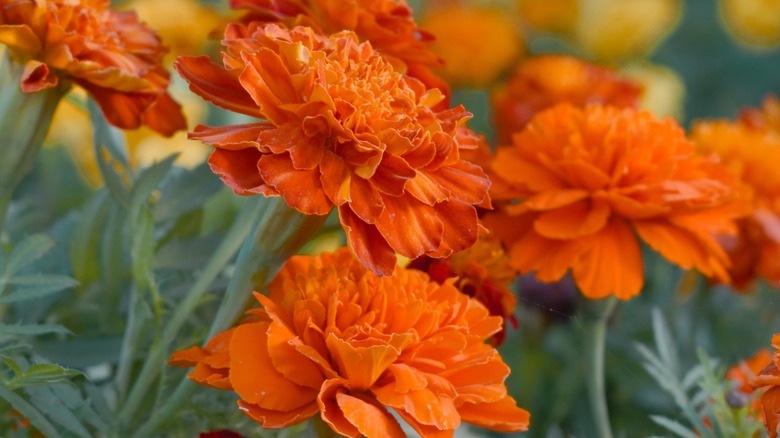Can Marigolds Help Repel Garden Pests? Here's What We Found
Few things disrupt the peace of a thriving garden more than uninvited pests. These tiny invaders can decimate tender leaves, disrupt fruiting, and generally put a damper on all of your gardening efforts. If you've ever watched all your hard work ruined by small, hidden invaders, you've probably looked for every natural solution that might help. In addition to a watering technique that avoids garden pests, one of the most common solutions whispered through gardening circles is planting Tagetes species, commonly known as marigolds. Do these vibrant blooms really act as a natural barrier against unwanted garden pests? The answer is yes, but the degree of protection and the type of insects that they keep away, depends largely on the specific type of marigold you plant.
When it comes to pest control, different marigold varieties offer varying levels of effectiveness. Each type offers unique benefits, targeting various issues both above and below the soil line. Understanding these differences is important to effectively use marigolds in your garden as a natural line of defense, while cultivating a healthier, more productive space without relying on harsh chemical solutions.
Beneath the surface: Marigolds and soil pests
While the bright blossoms of marigolds get a lot of attention, some of the most significant benefits of planting marigolds in your garden operate out of sight, beneath the soil. Tagetes patula, or French marigolds, are particularly renowned for their remarkable ability to combat root-knot nematodes, which are microscopic roundworms that attack plant roots. These worms can cause stunted growth, wilting, and reduced yields. The roots of these marigolds release special compounds, notably alpha-terthienyl, which are toxic to the destructive nematodes.
For this method to be most effective, French marigolds should be planted as a cover crop in infested areas for at least two to three months before introducing susceptible vegetable crops. Tilling the marigolds into the soil at the end of their growing season can significantly enhance their suppressive effect, helping to clear the soil of the pests for future plantings. It's important to note that not all marigold varieties deter all types of nematodes, and some may even host certain nematode species, making the selection of French marigolds, like the 'Tangerine', 'Janie', and 'Petit Gold' cultivars, important for this specific purpose.
Above-ground guardians: Marigolds and flying pests
Marigolds don't just deter pests underground, but they also guard against bugs above the soil. The pungent aroma emitted by some marigold varieties, especially Tagetes erecta, or African marigolds, is believed to deter common garden nuisances such as aphids, whiteflies, and even mosquitoes. This strong scent can confuse pests that rely on smell to locate their preferred host plants, essentially masking the aroma of nearby vegetables and flowers. Studies suggest that planting marigolds near tomatoes can reduce whitefly populations, since the marigolds release limonene, an aromatic compound that helps obscure the tomato's own scent. The strong fragrance acts as a natural barrier, making it more challenging for certain pests to settle and feed.
Marigolds are also excellent at attracting beneficial insects that prey on garden pests. Their bright, open flowers provide pollen to many garden allies, such as ladybugs, hoverflies, and parasitic wasps. Ladybug and hoverfly larvae are voracious predators of aphids, while parasitic wasps can help control caterpillars and other soft-bodied insects. By inviting these natural enemies into your garden, marigolds contribute to a balanced ecosystem, where nature's own pest control is allowed to flourish. While marigolds primarily repel, some varieties can also work as "trap crops" for certain pests, like spider mites or thrips, by attracting these invaders away from more valuable plants. For this system to work, consistent monitoring of these trap plants is needed to prevent them from becoming a breeding ground if not managed properly.


